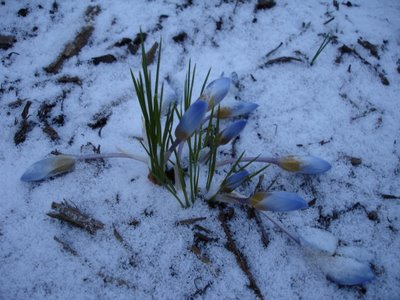Here's the transgression.

Someone has asked me, what is your compositional method? I write off the top of my head, I say. But I lie, a little. Most days, I write around the nub of something that plants itself early and picks up weight and shape, heft and features, as the day goes on. It's always a chance; some of the things that implant don't come to fruition, and others are gestating still.
This evening, the office is deepening, darkening; I haven't been here so late in weeks. There, where it has escaped my notice for hours, is the piece of cake left over from my afternoon class, when some students brought food for us, and I know what I am going to do, and it even has a title.
Here's the transgression:
Turn back from the coat and the door and the car and the trip home for more work, the work that will be there, the work that won't leave. Sit by the window where the light is blueing and eat your strange cake and read poems, the poems by the visiting writer with whom you'll dine tomorrow. Side-stepping responsibility for poetry is too delicious to do without full preparation: head to the bathroom, get yourself ready. In the bathroom, discover what you've known for several days, what you always know, as one does, through one means or another: that your body has been getting ready to drop another hint and has now dropped it, that that lifetime supply with which you were born has just diminished by one or two, that now would be the time to be careful were any care to be needed. Here's the transgression: no one will know, no one will want or need to know, it will be no more matter than the fact that it is, it will come to nothing, full stop. But your body can't keep itself quiet, can't accept what is not happening, must let you know in no uncertain terms, each and every month, that this fruitlessness has two weeks to live.
Back in the office, another transgression, an incursion into a space about which no one is supposed to know, about which you have not even known until just now: the first poem is "Deliverance" and begins with a birthing of death, a grappling with the still-to-be-stillborn. Livestock, not humans, you remind yourself helplessly; this poem is about cows and horses and pigs. But first it begins with a line that is perfect: "Then I realized I had read too many poems." And though you have not read too many poems, though you have never had as much patience for poems as you've wanted, though what you're about to read will complicate and qualify that line, you know what his nine words mean, in ways that even he may not know. The thing that's to come will come even without words, without "the human urgency, greasy hands / reaching deep into unimaginable places." The poem rails mutely, beholds, becomes, beats out "only the dumb rhythm of begetting," leaves us "shivering for no reason, no reason at all, / fresh from that hard dream of safety." The words and the writing are beside the point, really, except that nothing is beside the point of the real. (When the students brought in the cake, you think as you throw out your plate, it had a sign on it that warned readers not to eat: "This is a SCIENCE EXPERIMENT. You will be sorry!" You glimpsed blue and green under the paper and assumed mold, because you've been growing mold for years. You are terribly accomplished at mold-growing, at the cold creeping birth of new organisms.)
The poetry is over for you for now; it has, as so many things have lately, cut too close to the bone, spoken too resonantly to the body, been responded to too vigorously by the flesh. Put this paper away, button up for the slippery walk through spring snow, stop in the village to retrieve the movie that's come in the mail, the movie you're afraid to watch because of where the identifications will fall, seventeen years since you last saw it, since you said, that's the life I want, that one. Remember reading in Rolling Stone, back in seventh grade--not so long after the lunch recess when one girl screamed at another, "You tell that bitch I ain't pregnant and I'll show her a bloody rag if she don't believe me!" and you couldn't believe that anyone could shout such a thing and live--about how Jane panics at a security point because she's carrying condoms in her purse, and how the inclusion of such a thing in a major movie was penetrating to some new frank frontier. Remember being titillated by the very thought, even though you had no idea, just none at all--even though, of course, child of the 80s, you knew what condoms were and why they mattered. Remember when being twenty-nine and carefully eager, eagerly careful, seemed impossibly distant, did not even seem.
Here's the transgression:
Snow fell on the flowers this afternoon, the seasons crossing and clashing as they do most years, though everyone forgets and everyone frets and fusses. These are the things that would happen, as the poet says, "with or without us."
After the post office, the evening gone bluer, stop at the bookstore. Defy your own rules. Pick out more poetry, knowing how your patience has been growing all winter, knowing there's no more possible protection, no more care needed, only the filling and the fullness, the swelling into song, the urgent gripping and grappling into life.


4 Comments:
An ad for Always popped up as I finished your post.
that is just too wonderful to keep to myself.
I find it interesting, encouraging even, how the body equips itself to beat the odds. That is, we are made with the expectation of many chances that will come to nothing, yet it only takes one to transform one's life. Try as some might to plan and predict, sometimes life comes as a surprise.
my reaction came on such a gut, or should I say, ovary, level, I had to turn away. At 40, I just can't think about this too much, or I will howl.
nxbnbmix. now I feel better!
Didn't mean to make you howl, ttractor. Sorry about that.
And yes, the surprising of life--so strange.
Post a Comment
<< Home